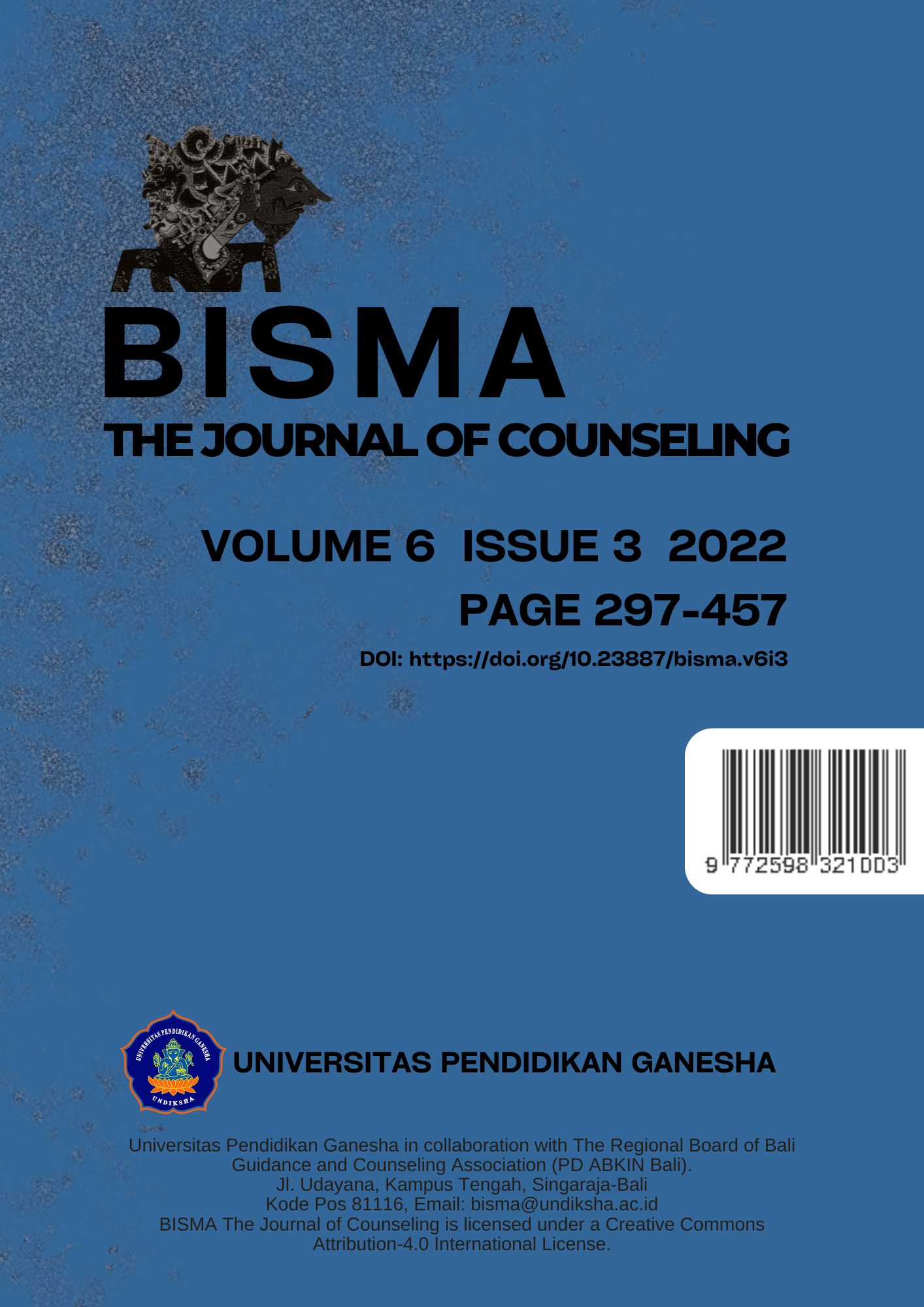Development of Tolerance and Peace Loving Character Assessment Instrument for Vocational High School Students
DOI:
https://doi.org/10.23887/bisma.v6i3.51559Keywords:
tolerance, peace loving, instrumentAbstract
This study aims to describe the tolerance and peace-loving character assessment instruments for vocational high school students. This research uses the Research & Development (R&D) method using the Borg and Gall method which has been adapted by Sugiyono. However, this study only used seven stages, namely: potentials and problems, data collection, product design, design validation, design revision, product testing, product revision. Instrument validity analysis was assisted with the help of Microsoft Excel. Reliability test using Alpha Cronbach formula. Based on the analysis, it is known that the reliability test results for the tolerance character instrument are 0.88 which indicates that the instrument used is reliable, as well as the peace-loving character assessment instrument. So it is recommended for teachers to use a peace-loving character assessment instrument for vocational high school students.
References
Amin, A. (2022). Alimni., Kurniawan, DA, Chen, D., & Wirayuda, RP (2022). Servation of Bengkulu local wisdom: The application of Syarafal Anam in preventing student radicalism. International Journal of Instruction, 15(3), 931-948.
Anggraeni, D. A. (2016). Implementasi Pengembangan Karakter Cinta Damai dan Tanggung Jawab Melalui Ekstrakurikuler Tapak Suci. UMSLibrary.
Apriani, O. Z., Wurjinem, & Kustianti, K. S. (2020). Analisis Nilai-Nilai Karakter Dalam Buku Cerita Rakyat Sang Piatu Menjadi Raja Dari Daerah Bengkulu. Juridikdas.
Baklashova, Galishnikova and Khafizova L.V. (2015). The Effects of Education on Tolerance : Research of Students Social and Ethnic Attitudes. Mediterranean Journal of Social Scienes.
Casmana, A. R., Dewantara, J. A., Timoera, D. A., Kusmawati, A. P., & Syafrudin, I. (2021). Global citizenship: preparing the younger generation to possess pro-environment behavior, mutual assistance and tolerance awareness through school engagement. Globalisation, Societies and Education, 1-18.
Dasmana, A., Wasliman, I., & Yoseptry, R. (2022). Implementation Of Integrated Quality Management Strengthening Character Education In Realizing Pancasila Student Profiles. IJGIE (International Journal of Graduate of Islamic Education), 3(2), 361-377.
Dewantara, J. A., Efriani, E., Sulistyarini, S., & Prasetiyo, W. H. (2020). Optimization of Character Education Through Community Participation Around The School Environment (Case Study in Lab School Junior High School Bandung). JED (Jurnal Etika Demokrasi), 5(1), 53-66.
Digdoyo, E. (2018). Kajian Isu Toleransi Beragama, Budaya, dan Tanggung Jawab Sosial Media. Jurnal Pancasila dan Kewarganegaraan.
Elder, A. (2020). The interpersonal is political: unfriending to promote civic discourse on social media. Ethics and Information Technology, 22(1), 15-24.
Husna, U., & Thohir, M. (2020). Religious moderation as a new approach to learning Islamic religious education in schools. Jurnal Pendidikan Islam, 14(1), 199-222.
Intania, E. V., & Sutama, S. (2020). The role of character education in learning during the COVID-19 pandemic. Jurnal Penelitian Ilmu Pendidikan, 13(2), 129-136.
Kartikawati, D., Awalya, & Mungin, E. W. (2017). Layanan Bimbingan Kelompok Teknik Sosiodrama Untuk Meningkatkan Karakter Cinta Damai Siswa. Indonesian Jpurnal of Guidance and Counseling Theory and Application.
Lisanti, G. H. (2013). Membangun Nilai Toleransi Siswa Melalui Metodethink Pair Share (TPS) Pada Mata Pelajaran Matematika Kelas V di SD Negeri Deresan. Fakultas Ilmu Pendidikan-Universitas Negeri Yogyakarta.
Mohtar Kamisi, R. H. (2022) Strengthening Character Education Management of Students Based on SARUMA Culture in Learning Pancasila and Citizenship Education in High Schools, South Halmahera Regency.
Novitasari, L., & Wardani, N. S. (2020). Pengembangan Instrumen Sikap Toleransi Dalam Pembelajaran Tematik Kelas 5 SD. Jurnal Penelitian Tindakan Kelas dan Pengembangan Pembelajaran, 41-52.
Oktapiani, P. R. (2021). Analisis Nilai Karakter Cinta Damai Dalam Novel Tentang Kamu Karya Tere Liye. Repository UIN Raden Fatah Palembang.
Riza, M., Widodo, S.,& Anindyarini. (2021). The Form of Tolerance Value in the Novel Bulan Terbelah di Langit Amerika by Hanum Salsabiela Rais and Rangga Almahendra. International Journal of Multicultural an Multireligious Understanding
Rustan, E., & Hanifah, N. (2018). De-radicalization in the Implementation of Islamic Education Curriculum in SMA Masamba South Sulawesi. Dinamika Ilmu, 271-283.
Safitri, L. (2022, November). Religious Tolerance In Multicultural Communities: English Learning Among Papuan Students In Jayapura. In International Conference on Cultures & Languages (ICCL) (Vol. 1, No. 1, pp. 864-871).
Spannring, R. (2019). Ecological citizenship education and the consumption of animal subjectivity. Education Sciences, 9(1), 41.
Sugiyono. (2015). Metode Penelitian Pendidikan. Bandung: 21st.ed.
Supriati, P. (2018). Pengembangan Instrumen Pengukuran Toleransi Pada Mahasiswa Sekolah Menengaj Pertama. Wiyata Dharma : Jurnal Penelitian dan Evaluasi Pendidikan, 117-123.
Taufik, M. (2021). Analysis The Value Of Characters On The Short Story In The Students Book Of Class III SD Theme 8 Praja Muda Karana. IRJE: Jurnal Ilmu Pendidikan, 1(2), 85-96.
Thiagarajan, & Sivasailan & Other. (1974). Instructional Development for Training Teachers of Exceptional Children : A Sourcebook. Journal of School Psychology.
Thielmann, I., Spadaro, G., & Balliet, D. (2020). Personality and prosocial behavior: A theoretical framework and meta-analysis. Psychological Bulletin, 146(1), 30.
Urbanus. (2021). Implementasi Nilai Karakter Cinta Damai Sebagai Upaya Mewujudkan Gereja Yang Sehat. Prosiding Seminar Nasional STT Sumatera Utara.
Utomo, C., & Wasino, W. (2020). An Integrated Teaching Tolerance in Learning History of Indonesian National Movement at Higher Education. Journal of Social Studies Education Research, 11(3), 65-108.
Wójcik, M., Thornberg, R., Flak, W., & Leśniewski, J. (2022). Downward spiral of bullying: Victimization timeline from former victims’ perspective. Journal of interpersonal violence, 37(13-14), NP10985-NP11008.
Zickgraf, H. F., Richard, E., Zucker, N. L., & Wallace, G. L. (2020). Rigidity and sensory sensitivity: Independent contributions to selective eating in children, adolescents, and young adults. Journal of Clinical Child & Adolescent Psychology, 1-13.
Zubaedi. (2011). Desain Pendidikan Karakter : Konsep Dan Aplikasinya Dalam Lembaga Pendidikan. Jakarta: Kencana Media Group
Downloads
Published
Issue
Section
License
Copyright (c) 2022 Komang Niti Widianti, I Ketut Gading, Ni Ketut Suarni

This work is licensed under a Creative Commons Attribution 4.0 International License.









